ZyXEL ES-2108-LC, ES-2108-G User Guide

ES-2108/ES-2108-G
Ethernet Switch
User’s Guide
Version 3.60
10/2005
Edition 1

ES-2108/ES-2108-G User’s Guide
Copyright
Copyright © 2005 by ZyXEL Communications Corporation.
The contents of this publication may not be reproduced in any part or as a whole, transcribed, stored in a retrieval system, translated into any language, or transmitted in any form or by any means, electronic, mechanical, magnetic, optical, chemical, photocopying, manual, or otherwise, without the prior written permission of ZyXEL Communications Corporation.
Published by ZyXEL Communications Corporation. All rights reserved.
Disclaimer
ZyXEL does not assume any liability arising out of the application or use of any products, or software described herein. Neither does it convey any license under its patent rights nor the patent rights of others. ZyXEL further reserves the right to make changes in any products described herein without notice. This publication is subject to change without notice.
Copyright |
1 |

ES-2108/ES-2108-G User’s Guide
Interference Statements and
Warnings
FCC Statement
This switch complies with Part 15 of the FCC rules. Operation is subject to the following two conditions:
1This switch may not cause harmful interference.
2This switch must accept any interference received, including interference that may cause undesired operations.
FCC Warning
This equipment has been tested and found to comply with the limits for a Class A digital switch, pursuant to Part 15 of the FCC Rules. These limits are designed to provide reasonable protection against harmful interference in a commercial environment. This equipment generates, uses, and can radiate radio frequency energy and, if not installed and used in accordance with the instruction manual, may cause harmful interference to radio communications. Operation of this equipment in a residential area is likely to cause harmful interference in which case the user will be required to correct the interference at his own expense.
CE Mark Warning:
This is a class A product. In a domestic environment this product may cause radio interference in which case the user may be required to take adequate measures.
Taiwanese BSMI (Bureau of Standards, Metrology and Inspection) A Warning:
Notice 1
Changes or modifications not expressly approved by the party responsible for compliance could void the user's authority to operate the equipment.
This Class A digital apparatus complies with Canadian ICES-003.
Cet appareil numérique de la classe A est conforme à la norme NMB-003 du Canada.
2 |
Interference Statements and Warnings |

ES-2108/ES-2108-G User’s Guide
Certifications
1Go to www.zyxel.com
2Select your product from the drop-down list box on the ZyXEL home page to go to that product's page.
3Select the certification you wish to view from this page.
Registration
Register your product online for free future product updates and information at www.zyxel.com for global products, or at www.us.zyxel.com for North American products.
Safety Warnings
For your safety, be sure to read and follow all warning notices and instructions.
•To reduce the risk of fire, use only No. 26 AWG (American Wire Gauge) or larger telecommunication line cord.
•Do NOT open the device or unit. Opening or removing covers can expose you to dangerous high voltage points or other risks. ONLY qualified service personnel can service the device. Please contact your vendor for further information.
•Use ONLY the dedicated power supply for your device. Connect the power cord or power adaptor to the right supply voltage (110V AC in North America or 230V AC in Europe).
•Do NOT use the device if the power supply is damaged as it might cause electrocution.
•If the power supply is damaged, remove it from the power outlet.
•Do NOT attempt to repair the power supply. Contact your local vendor to order a new power supply.
•Place connecting cables carefully so that no one will step on them or stumble over them. Do NOT allow anything to rest on the power cord and do NOT locate the product where anyone can walk on the power cord.
•If you wall mount your device, make sure that no electrical, gas or water pipes will be damaged.
•Do NOT install nor use your device during a thunderstorm. There may be a remote risk of electric shock from lightning.
•Do NOT expose your device to dampness, dust or corrosive liquids.
•Do NOT use this product near water, for example, in a wet basement or near a swimming pool.
•Make sure to connect the cables to the correct ports.
•Do NOT obstruct the device ventilation slots, as insufficient airflow may harm your device.
•Do NOT store things on the device.
•Connect ONLY suitable accessories to the device.
Interference Statements and Warnings |
3 |

ES-2108/ES-2108-G User’s Guide
ZyXEL Limited Warranty
ZyXEL warrants to the original end user (purchaser) that this product is free from any defects in materials or workmanship for a period of up to two years from the date of purchase. During the warranty period, and upon proof of purchase, should the product have indications of failure due to faulty workmanship and/or materials, ZyXEL will, at its discretion, repair or replace the defective products or components without charge for either parts or labor, and to whatever extent it shall deem necessary to restore the product or components to proper operating condition. Any replacement will consist of a new or re-manufactured functionally equivalent product of equal value, and will be solely at the discretion of ZyXEL. This warranty shall not apply if the product is modified, misused, tampered with, damaged by an act of God, or subjected to abnormal working conditions.
Note
Repair or replacement, as provided under this warranty, is the exclusive remedy of the purchaser. This warranty is in lieu of all other warranties, express or implied, including any implied warranty of merchantability or fitness for a particular use or purpose. ZyXEL shall in no event be held liable for indirect or consequential damages of any kind of character to the purchaser.
To obtain the services of this warranty, contact ZyXEL's Service Center for your Return Material Authorization number (RMA). Products must be returned Postage Prepaid. It is recommended that the unit be insured when shipped. Any returned products without proof of purchase or those with an out-dated warranty will be repaired or replaced (at the discretion of ZyXEL) and the customer will be billed for parts and labor. All repaired or replaced products will be shipped by ZyXEL to the corresponding return address, Postage Paid. This warranty gives you specific legal rights, and you may also have other rights that vary from country to country.
4 |
ZyXEL Limited Warranty |

ES-2108/ES-2108-G User’s Guide
Customer Support
Please have the following information ready when you contact customer support.
•Product model and serial number.
•Warranty Information.
•Date that you received your device.
•Brief description of the problem and the steps you took to solve it.
METHOD |
SUPPORT E-MAIL |
TELEPHONE* |
WEB SITE |
REGULAR MAIL |
|
|
|
|
|
||
LOCATION |
SALES E-MAIL |
FAX |
FTP SITE |
||
|
|||||
|
|
|
|
|
|
CORPORATE |
support@zyxel.com.tw |
+886-3-578-3942 |
www.zyxel.com |
ZyXEL Communications Corp. |
|
|
|
www.europe.zyxel.com |
6 Innovation Road II |
||
HEADQUARTERS |
|
|
|
Science Park |
|
sales@zyxel.com.tw |
+886-3-578-2439 |
ftp.zyxel.com |
|||
(WORLDWIDE) |
Hsinchu 300 |
||||
|
|
|
ftp.europe.zyxel.com |
Taiwan |
|
|
info@cz.zyxel.com |
+420-241-091-350 |
www.zyxel.cz |
ZyXEL Communications |
|
|
|
|
|
Czech s.r.o. |
|
CZECH REPUBLIC |
info@cz.zyxel.com |
+420-241-091-359 |
|
||
|
Modranská 621 |
||||
|
|
|
|
143 01 Praha 4 - Modrany |
|
|
|
|
|
Ceská Republika |
|
|
support@zyxel.dk |
+45-39-55-07-00 |
www.zyxel.dk |
ZyXEL Communications A/S |
|
DENMARK |
|
|
|
Columbusvej |
|
sales@zyxel.dk |
+45-39-55-07-07 |
|
|||
|
2860 Soeborg |
||||
|
|
|
|
Denmark |
|
|
support@zyxel.fi |
+358-9-4780-8411 |
www.zyxel.fi |
ZyXEL Communications Oy |
|
FINLAND |
|
|
|
Malminkaari 10 |
|
sales@zyxel.fi |
+358-9-4780 8448 |
|
|||
|
00700 Helsinki |
||||
|
|
|
|
Finland |
|
|
info@zyxel.fr |
+33-4-72-52-97-97 |
www.zyxel.fr |
ZyXEL France |
|
|
|
|
|
1 rue des Vergers |
|
FRANCE |
|
+33-4-72-52-19-20 |
|
||
|
|
Bat. 1 / C |
|||
|
|
|
|
69760 Limonest |
|
|
|
|
|
France |
|
|
support@zyxel.de |
+49-2405-6909-0 |
www.zyxel.de |
ZyXEL Deutschland GmbH. |
|
GERMANY |
|
|
|
Adenauerstr. 20/A2 D-52146 |
|
sales@zyxel.de |
+49-2405-6909-99 |
|
|||
|
Wuerselen |
||||
|
|
|
|
Germany |
|
|
support@zyxel.hu |
+36-1-3361649 |
www.zyxel.hu |
ZyXEL Hungary |
|
HUNGARY |
|
|
|
48, Zoldlomb Str. |
|
info@zyxel.hu |
+36-1-3259100 |
|
|||
|
H-1025, Budapest |
||||
|
|
|
|
Hungary |
|
|
http://zyxel.kz/support |
+7-3272-590-698 |
www.zyxel.kz |
ZyXEL Kazakhstan |
|
|
|
|
|
43, Dostyk ave.,Office 414 |
|
KAZAKHSTAN |
sales@zyxel.kz |
+7-3272-590-689 |
|
||
|
Dostyk Business Centre |
||||
|
|
|
|
050010, Almaty |
|
|
|
|
|
Republic of Kazakhstan |
|
|
support@zyxel.com |
1-800-255-4101 |
www.us.zyxel.com |
ZyXEL Communications Inc. |
|
|
|
+1-714-632-0882 |
|
1130 N. Miller St. |
|
NORTH AMERICA |
|
|
|
Anaheim |
|
|
sales@zyxel.com |
+1-714-632-0858 |
ftp.us.zyxel.com |
CA 92806-2001 |
|
|
|
|
|
U.S.A. |
|
|
support@zyxel.no |
+47-22-80-61-80 |
www.zyxel.no |
ZyXEL Communications A/S |
|
NORWAY |
|
|
|
Nils Hansens vei 13 |
|
sales@zyxel.no |
+47-22-80-61-81 |
|
|||
|
0667 Oslo |
||||
|
|
|
|
Norway |
Customer Support |
5 |

ES-2108/ES-2108-G User’s Guide
METHOD |
SUPPORT E-MAIL |
TELEPHONE* |
WEB SITE |
REGULAR MAIL |
|
|
|
|
|
||
LOCATION |
SALES E-MAIL |
FAX |
FTP SITE |
||
|
|||||
|
|
|
|
|
|
|
info@pl.zyxel.com |
+48-22-5286603 |
www.pl.zyxel.com |
ZyXEL Communications |
|
POLAND |
|
|
|
ul.Emilli Plater 53 |
|
|
+48-22-5206701 |
|
|||
|
|
00-113 Warszawa |
|||
|
|
|
|
Poland |
|
|
http://zyxel.ru/support |
+7-095-542-89-29 |
www.zyxel.ru |
ZyXEL Russia |
|
RUSSIA |
|
|
|
Ostrovityanova 37a Str. |
|
sales@zyxel.ru |
+7-095-542-89-25 |
|
|||
|
Moscow, 117279 |
||||
|
|
|
|
Russia |
|
|
support@zyxel.es |
+34-902-195-420 |
www.zyxel.es |
ZyXEL Communications |
|
SPAIN |
|
|
|
Alejandro Villegas 33 |
|
sales@zyxel.es |
+34-913-005-345 |
|
|||
|
1º, 28043 Madrid |
||||
|
|
|
|
Spain |
|
|
support@zyxel.se |
+46-31-744-7700 |
www.zyxel.se |
ZyXEL Communications A/S |
|
SWEDEN |
|
|
|
Sjöporten 4, 41764 Göteborg |
|
sales@zyxel.se |
+46-31-744-7701 |
|
|||
|
|
Sweden |
|||
|
|
|
|
|
|
|
support@ua.zyxel.com |
+380-44-247-69-78 |
www.ua.zyxel.com |
ZyXEL Ukraine |
|
UKRAINE |
|
|
|
13, Pimonenko Str. |
|
sales@ua.zyxel.com |
+380-44-494-49-32 |
|
|||
|
Kiev, 04050 |
||||
|
|
|
|
Ukraine |
|
|
support@zyxel.co.uk |
+44-1344 303044 |
www.zyxel.co.uk |
ZyXEL Communications UK |
|
|
|
08707 555779 (UK only) |
|
Ltd.,11 The Courtyard, |
|
UNITED KINGDOM |
|
|
|
Eastern Road, Bracknell, |
|
|
sales@zyxel.co.uk |
+44-1344 303034 |
ftp.zyxel.co.uk |
Berkshire, RG12 2XB, |
|
|
|
|
|
United Kingdom (UK) |
* “+” is the (prefix) number you enter to make an international telephone call.
6 |
Customer Support |

ES-2108/ES-2108-G User’s Guide
Table of Contents
Copyright |
.................................................................................................................. |
1 |
Interference Statements and Warnings.................................................................. |
2 |
|
ZyXEL Limited Warranty ......................................................................................... |
4 |
|
Customer Support ................................................................................................... |
5 |
|
Table of Contents..................................................................................................... |
7 |
|
List of Figures ........................................................................................................ |
15 |
|
List of Tables .......................................................................................................... |
19 |
|
Preface.................................................................................................................... |
|
21 |
Chapter 1 |
|
|
Getting to Know Your Switch................................................................................ |
23 |
|
1.1 |
Introduction ........................................................................................................ |
23 |
1.2 |
Software Features ............................................................................................. |
23 |
1.3 |
Hardware Features ............................................................................................ |
25 |
1.4 |
Applications ....................................................................................................... |
25 |
|
1.4.1 Backbone Application ............................................................................... |
25 |
|
1.4.2 Bridging Example ..................................................................................... |
26 |
|
1.4.3 High Performance Switched Example ...................................................... |
26 |
|
1.4.4 IEEE 802.1Q VLAN Application Examples .............................................. |
27 |
|
1.4.4.1 Tag-based VLAN Example ............................................................. |
27 |
|
1.4.4.2 VLAN Shared Server Example ....................................................... |
28 |
Chapter 2 |
|
|
Hardware Installation and Connection ................................................................ |
29 |
|
2.1 |
Freestanding Installation ................................................................................... |
29 |
2.2 |
Mounting the Switch on a Rack ........................................................................ |
30 |
|
2.2.1 Rack-mounted Installation Requirements ................................................ |
30 |
|
2.2.1.1 Precautions .................................................................................... |
30 |
|
2.2.2 Attaching the Mounting Brackets to the Switch ........................................ |
30 |
|
2.2.3 Mounting the Switch on a Rack ................................................................ |
30 |
Chapter 3 |
|
|
Hardware Overview................................................................................................ |
33 |
|
3.1 |
Front Panel Connection .................................................................................... |
33 |
Table of Contents |
7 |

ES-2108/ES-2108-G User’s Guide
|
3.1.1 Console Port ........................................................................................... |
34 |
|
3.1.2 Ethernet Ports .......................................................................................... |
34 |
|
3.1.2.1 Default Ethernet Settings ................................................................ |
34 |
|
3.1.3 Mini-GBIC Slot ........................................................................................ |
34 |
|
3.1.3.1 Transceiver Installation ................................................................ |
35 |
|
3.1.3.2 Transceiver Removal ................................................................... |
36 |
3.2 |
Rear Panel ........................................................................................................ |
37 |
|
3.2.1 Power Connector ..................................................................................... |
37 |
3.3 |
Front Panel LEDs .......................................................................................... |
37 |
Chapter 4 |
|
|
The Web Configurator ........................................................................................... |
39 |
|
4.1 |
Introduction ........................................................................................................ |
39 |
4.2 |
System Login .................................................................................................. |
39 |
4.3 |
The Status Screen ........................................................................................ |
40 |
|
4.3.1 Change Your Password ........................................................................ |
43 |
4.4 |
Switch Lockout ................................................................................................ |
43 |
4.5 |
Resetting the Switch ....................................................................................... |
43 |
|
4.5.1 Reload the Factory-default Configuration File ........................................ |
44 |
4.6 |
Logging Out of the Web Configurator ............................................................... |
44 |
4.7 |
Help ................................................................................................................. |
45 |
Chapter 5 |
|
|
Initial Setup Example............................................................................................. |
47 |
|
5.1 |
Overview ............................................................................................................ |
47 |
|
5.1.1 Creating a VLAN ...................................................................................... |
47 |
|
5.1.2 Setting Port VID ....................................................................................... |
48 |
|
5.1.3 Configuring Switch Management IP Address ........................................... |
49 |
Chapter 6 |
|
|
System Status and Port Statistics........................................................................ |
51 |
|
6.1 |
Overview ............................................................................................................ |
51 |
6.2 |
Port Status Summary ..................................................................................... |
51 |
|
6.2.1 Status: Port Details .............................................................................. |
52 |
Chapter 7 |
|
|
Basic Setting ......................................................................................................... |
57 |
|
7.1 |
Overview ............................................................................................................ |
57 |
7.2 |
System Information ........................................................................................ |
57 |
7.3 |
General Setup .............................................................................................. |
58 |
7.4 |
Introduction to VLANs ...................................................................................... |
59 |
7.5 |
IGMP Snooping ................................................................................................ |
60 |
7.6 |
Switch Setup Screen ...................................................................................... |
60 |
8 |
Table of Contents |

|
|
ES-2108/ES-2108-G User’s Guide |
7.7 |
IP Setup .......................................................................................................... |
62 |
|
7.7.1 Management IP Addresses ...................................................................... |
62 |
7.8 |
Port Setup ....................................................................................................... |
64 |
Chapter 8 |
|
|
VLAN ....................................................................................................................... |
|
67 |
8.1 |
Introduction to IEEE 802.1Q Tagged VLAN .................................................... |
67 |
|
8.1.1 Forwarding Tagged and Untagged Frames ............................................. |
67 |
8.2 |
Automatic VLAN Registration .......................................................................... |
68 |
|
8.2.1 GARP ...................................................................................................... |
68 |
|
8.2.1.1 GARP Timers ................................................................................. |
68 |
|
8.2.2 GVRP ....................................................................................................... |
68 |
8.3 |
Port VLAN Trunking ......................................................................................... |
69 |
8.4 |
Select the VLAN Type ...................................................................................... |
69 |
8.5 |
Static VLAN ....................................................................................................... |
70 |
|
8.5.1 Static VLAN Status .................................................................................. |
70 |
|
8.5.2 Configure a Static VLAN ...................................................................... |
71 |
|
8.5.3 Configure VLAN Port Settings .............................................................. |
73 |
8.6 |
Port-based VLAN Setup ............................................................................... |
74 |
|
8.6.1 Configure a Port-based VLAN .................................................................. |
74 |
Chapter 9 |
|
|
Static MAC Forwarding.......................................................................................... |
77 |
|
9.1 |
Overview ............................................................................................................ |
77 |
9.2 |
Configuring Static MAC Forwarding ............................................................. |
77 |
Chapter 10 |
|
|
Filtering................................................................................................................... |
|
79 |
10.1 Overview .......................................................................................................... |
79 |
|
10.2 Configure a Filtering Rule ............................................................................. |
79 |
|
Chapter 11 |
|
|
Spanning Tree Protocol......................................................................................... |
81 |
|
11.1 Overview .......................................................................................................... |
81 |
|
|
11.1.1 STP Terminology ................................................................................... |
81 |
|
11.1.2 How STP Works .................................................................................... |
82 |
|
11.1.3 STP Port States ..................................................................................... |
82 |
11.2 STP Status ................................................................................................. |
82 |
|
11.3 Configure STP .............................................................................................. |
84 |
|
Chapter 12 |
|
|
Bandwidth Control................................................................................................. |
87 |
|
12.1 Bandwidth Control Setup ................................................................................ |
87 |
|
Table of Contents |
9 |

ES-2108/ES-2108-G User’s Guide
Chapter 13 |
|
|
Broadcast Storm Control ...................................................................................... |
89 |
|
13.1 |
Overview .......................................................................................................... |
89 |
13.2 |
Broadcast Storm Control Setup ...................................................................... |
89 |
Chapter 14 |
|
|
Mirroring ................................................................................................................. |
|
91 |
14.1 |
Overview .......................................................................................................... |
91 |
14.2 |
Port Mirroring Setup ....................................................................................... |
91 |
Chapter 15 |
|
|
Link Aggregation ................................................................................................... |
93 |
|
15.1 |
Overview .......................................................................................................... |
93 |
15.2 |
Dynamic Link Aggregation ............................................................................. |
93 |
15.2.1 Link Aggregation ID ............................................................................... |
94 |
|
15.3 |
Link Aggregation Status .................................................................................. |
94 |
15.4 |
Link Aggregation Setup ................................................................................. |
95 |
Chapter 16 |
|
|
Port Authentication................................................................................................ |
97 |
|
16.1 |
Overview .......................................................................................................... |
97 |
16.1.1 RADIUS ................................................................................................. |
97 |
|
16.2 |
Port Authentication Configuration ................................................................... |
97 |
16.2.1 Activate IEEE 802.1x Security ............................................................ |
98 |
|
16.2.2 Configuring RADIUS Server Settings ................................................. |
99 |
|
Chapter 17 |
|
|
Port Security......................................................................................................... |
101 |
|
17.1 |
Overview ........................................................................................................ |
101 |
17.2 |
Port Security Setup ....................................................................................... |
101 |
Chapter 18 |
|
|
Queuing Method................................................................................................... |
103 |
|
18.1 |
Overview ........................................................................................................ |
103 |
18.1.1 Strict Priority Queuing (SPQ) .............................................................. |
103 |
|
18.1.2 Weighted Round Robin Scheduling (WRR) ......................................... |
103 |
|
18.2 |
Configuring Queuing Method ........................................................................ |
104 |
Chapter 19 |
|
|
Static Route .......................................................................................................... |
105 |
|
19.1 |
Configuring Static Route .............................................................................. |
105 |
10 |
Table of Contents |

|
|
ES-2108/ES-2108-G User’s Guide |
Chapter 20 |
|
|
Differentiated Services ........................................................................................ |
107 |
|
20.1 |
Overview ........................................................................................................ |
107 |
20.1.1 DSCP and Per-Hop Behavior .............................................................. |
107 |
|
20.1.2 DiffServ Network Example .................................................................. |
107 |
|
20.2 |
Activating DiffServ ....................................................................................... |
108 |
20.3 |
DSCP-to-IEEE802.1p Priority Mapping .................................................... |
109 |
20.3.1 Configuring DSCP Settings .................................................................. |
109 |
|
Chapter 21 |
|
|
Maintenance .......................................................................................................... |
111 |
|
21.1 |
The Maintenance Screen .............................................................................. |
111 |
21.2 |
Firmware Upgrade ...................................................................................... |
112 |
21.3 |
Restore a Configuration File ........................................................................ |
112 |
21.4 |
Backing Up a Configuration File .................................................................. |
113 |
21.5 |
Load Factory Defaults ................................................................................. |
113 |
21.6 |
Reboot System ............................................................................................ |
114 |
21.7 FTP Command Line ...................................................................................... |
114 |
|
21.7.1 Filename Conventions ........................................................................ |
114 |
|
|
21.7.1.1 Example FTP Commands .......................................................... |
115 |
21.7.2 FTP Command Line Procedure .......................................................... |
115 |
|
21.7.3 GUI-based FTP Clients ........................................................................ |
116 |
|
21.7.4 FTP Restrictions .................................................................................. |
116 |
|
Chapter 22 |
|
|
Access Control...................................................................................................... |
117 |
|
22.1 |
Overview ...................................................................................................... |
117 |
22.2 |
The Access Control Main Screen .................................................................. |
117 |
22.3 About SNMP ................................................................................................ |
118 |
|
22.3.1 Supported MIBs ................................................................................. |
119 |
|
22.3.2 SNMP Traps ....................................................................................... |
119 |
|
22.3.3 Configuring SNMP .............................................................................. |
119 |
|
22.4 |
Setting Up Login Accounts ......................................................................... |
120 |
22.5 |
SSH Overview ............................................................................................... |
121 |
22.6 How SSH works ............................................................................................. |
122 |
|
22.7 |
SSH Implementation on the Switch ............................................................... |
123 |
22.7.1 Requirements for Using SSH ............................................................... |
123 |
|
22.7.2 SSH Login Example ............................................................................. |
123 |
|
22.8 |
Introduction to HTTPS ................................................................................... |
124 |
22.9 HTTPS Example ............................................................................................ |
125 |
|
22.9.1 Internet Explorer Warning Messages ................................................... |
125 |
|
22.9.2 Netscape Navigator Warning Messages .............................................. |
126 |
|
22.9.3 The Main Screen .................................................................................. |
127 |
|
Table of Contents |
11 |

ES-2108/ES-2108-G User’s Guide
22.10 Service Port Access Control ..................................................................... |
128 |
|
22.11 Remote Management ............................................................................... |
129 |
|
Chapter 23 |
|
|
Diagnostic............................................................................................................. |
|
131 |
23.1 |
Diagnostic .................................................................................................... |
131 |
Chapter 24 |
|
|
Cluster Management............................................................................................ |
133 |
|
24.1 |
Overview ........................................................................................................ |
133 |
24.2 |
Cluster Management Status ........................................................................ |
134 |
24.2.1 Cluster Member Switch Management ................................................. |
135 |
|
|
24.2.1.1 Uploading Firmware to a Cluster Member Switch .................... |
135 |
24.3 |
Configuring Cluster Management ................................................................ |
136 |
Chapter 25 |
|
|
MAC Table............................................................................................................. |
|
139 |
25.1 |
Overview ........................................................................................................ |
139 |
25.2 |
Viewing the MAC Table ................................................................................ |
140 |
Chapter 26 |
|
|
ARP Table ............................................................................................................. |
|
141 |
26.1 |
Overview ........................................................................................................ |
141 |
26.1.1 How ARP Works .................................................................................. |
141 |
|
26.2 |
Viewing the ARP Table ................................................................................ |
141 |
Chapter 27 |
|
|
Introducing the Commands .............................................................................. |
143 |
|
27.1 |
Overview ........................................................................................................ |
143 |
27.1.1 Switch Configuration File ..................................................................... |
143 |
|
27.2 |
Accessing the CLI ........................................................................................ |
143 |
27.2.1 Access Priority .................................................................................... |
144 |
|
27.2.2 The Console Port ................................................................................. |
144 |
|
|
27.2.2.1 Initial Screen ............................................................................... |
144 |
27.2.3 Telnet ................................................................................................... |
144 |
|
27.2.4 SSH ...................................................................................................... |
145 |
|
27.3 |
The Login Screen ......................................................................................... |
145 |
27.4 |
Command Syntax Conventions ..................................................................... |
146 |
27.5 |
Getting Help ................................................................................................... |
146 |
27.5.1 List of Available Commands ................................................................. |
146 |
|
27.5.2 Detailed Command Information ........................................................... |
147 |
|
27.6 Command Modes .......................................................................................... |
148 |
|
27.7 |
Using Command History ................................................................................ |
149 |
12 |
Table of Contents |

|
ES-2108/ES-2108-G User’s Guide |
27.8 Saving Your Configuration ............................................................................. |
149 |
27.8.1 Logging Out .......................................................................................... |
149 |
27.9 Command Summary ...................................................................................... |
149 |
27.9.1 User Mode ............................................................................................ |
150 |
27.9.2 Enable Mode ........................................................................................ |
150 |
27.9.3 General Configuration Mode ................................................................ |
153 |
27.9.4 interface port-channel Commands ....................................................... |
160 |
27.9.5 config-vlan Commands ........................................................................ |
162 |
Chapter 28 |
|
Command Examples........................................................................................... |
165 |
28.1 Overview ........................................................................................................ |
165 |
28.2 show Commands ........................................................................................... |
165 |
28.2.1 show system-information .................................................................... |
165 |
28.2.2 show ip ................................................................................................. |
166 |
28.2.3 show logging ....................................................................................... |
166 |
28.2.4 show interface ..................................................................................... |
167 |
28.2.5 show mac address-table ..................................................................... |
168 |
28.3 ping ............................................................................................................... |
169 |
28.4 traceroute ...................................................................................................... |
169 |
28.5 Enabling RSTP .............................................................................................. |
170 |
28.6 Configuration File Maintenance .................................................................... |
170 |
28.6.1 Restarting the Switch ........................................................................... |
170 |
28.6.2 Resetting to the Factory Default ........................................................... |
171 |
28.7 no Command Examples ................................................................................ |
171 |
28.7.1 no mirror-port ...................................................................................... |
171 |
28.7.2 no https timeout .................................................................................... |
172 |
28.7.3 no trunk ................................................................................................ |
172 |
28.7.4 no port-access-authenticator ................................................................ |
173 |
28.7.5 no ssh ................................................................................................... |
173 |
28.8 spq ................................................................................................................ |
174 |
28.9 wrr ................................................................................................................. |
174 |
28.10 interface Commands ................................................................................... |
175 |
28.10.1 interface port-channel ....................................................................... |
175 |
28.10.2 bmstorm-limit ..................................................................................... |
175 |
28.10.3 bandwidth-limit .................................................................................. |
176 |
28.10.4 mirror ................................................................................................. |
176 |
28.10.5 gvrp ................................................................................................... |
177 |
28.10.6 frame-type ......................................................................................... |
178 |
28.10.7 egress set .......................................................................................... |
178 |
28.10.8 qos priority .......................................................................................... |
179 |
28.10.9 name .................................................................................................. |
179 |
28.10.10 speed-duplex .................................................................................... |
180 |
Table of Contents |
13 |

ES-2108/ES-2108-G User’s Guide
Chapter 29 |
|
|
IEEE 802.1Q Tagged VLAN Commands ............................................................. |
181 |
|
29.1 |
IEEE 802.1Q Tagged VLAN Overview .......................................................... |
181 |
29.2 |
VLAN Databases ........................................................................................... |
181 |
29.2.1 Static Entries (SVLAN Table) ............................................................... |
181 |
|
29.2.2 Dynamic Entries (DVLAN Table) .......................................................... |
182 |
|
29.3 |
Configuring Tagged VLAN ............................................................................. |
182 |
29.4 |
Global VLAN1Q Tagged VLAN Configuration Commands ............................ |
183 |
29.4.1 GARP Status ........................................................................................ |
183 |
|
29.4.2 GARP Timer ........................................................................................ |
183 |
|
29.4.3 GVRP Timer ......................................................................................... |
184 |
|
29.4.4 Enable GVRP ....................................................................................... |
184 |
|
29.4.5 Disable GVRP ...................................................................................... |
185 |
|
29.4.6 Enable Ingress Checking .................................................................... |
185 |
|
29.5 Port VLAN Commands .................................................................................. |
185 |
|
29.5.1 Set Port VID ........................................................................................ |
185 |
|
29.5.2 Set Acceptable Frame Type ................................................................. |
186 |
|
29.5.3 Enable or Disable Port GVRP .............................................................. |
186 |
|
29.5.4 Modify Static VLAN ............................................................................. |
186 |
|
|
29.5.4.1 Modify a Static VLAN Table Example ......................................... |
187 |
|
29.5.4.2 Forwarding Process Example ..................................................... |
187 |
29.5.5 Delete VLAN ID .................................................................................... |
188 |
|
29.6 |
Enable VLAN ................................................................................................ |
188 |
29.7 |
Disable VLAN ................................................................................................ |
189 |
29.8 |
Show VLAN Setting ...................................................................................... |
189 |
Chapter 30 |
|
|
Troubleshooting................................................................................................... |
191 |
|
30.1 |
Problems Starting Up the Switch ................................................................... |
191 |
30.2 |
Problems Accessing the Switch .................................................................... |
191 |
30.2.1 Pop-up Windows, JavaScripts and Java Permissions ......................... |
192 |
|
|
30.2.1.1 Internet Explorer Pop-up Blockers .............................................. |
192 |
|
30.2.1.2 JavaScripts ................................................................................. |
195 |
|
30.2.1.3 Java Permissions ....................................................................... |
197 |
30.3 |
Problems with the Password ......................................................................... |
199 |
Appendix A |
|
|
Product Specifications ........................................................................................ |
201 |
|
Appendix B |
|
|
IP Subnetting........................................................................................................ |
205 |
|
Index...................................................................................................................... |
|
213 |
14 |
Table of Contents |

ES-2108/ES-2108-G User’s Guide
List of Figures
Figure 1 Backbone Application .............................................................................. |
26 |
Figure 2 Bridging Application ................................................................................ |
26 |
Figure 3 High Performance Switched Application ................................................. |
27 |
Figure 4 Tag-based VLAN Application ................................................................... |
28 |
Figure 5 Shared Server Using VLAN Example ...................................................... |
28 |
Figure 6 Attaching Rubber Feet ............................................................................ |
29 |
Figure 7 Attaching the Mounting Brackets ............................................................. |
30 |
Figure 8 Mounting the Switch on a Rack .............................................................. |
31 |
Figure 9 Front Panel: ES-2108 .............................................................................. |
33 |
Figure 10 Front Panel: ES-2108-G ....................................................................... |
33 |
Figure 11 Transceiver Installation Example ........................................................... |
35 |
Figure 12 Installed Transceiver ............................................................................ |
36 |
Figure 13 Opening the Transceiver’s Latch Example ............................................ |
36 |
Figure 14 Transceiver Removal Example .............................................................. |
36 |
Figure 15 Rear Panel ............................................................................................ |
37 |
Figure 16 Web Configurator: Login ........................................................................ |
39 |
Figure 17 Web Configurator Home Screen (Status) .............................................. |
40 |
Figure 18 Change Administrator Login Password ................................................. |
43 |
Figure 19 Resetting the Switch: Via the Console Port ........................................... |
44 |
Figure 20 Web Configurator: Logout Screen ......................................................... |
45 |
Figure 21 Initial Setup Network Example: VLAN ................................................... |
47 |
Figure 22 Initial Setup Network Example: Port VID ............................................... |
49 |
Figure 23 Initial Setup Example: Management IP Address ................................... |
50 |
Figure 24 Status .................................................................................................... |
51 |
Figure 25 Status: Port Details ................................................................................ |
53 |
Figure 26 System Info ........................................................................................... |
57 |
Figure 27 General Setup ....................................................................................... |
58 |
Figure 28 Switch Setup ......................................................................................... |
61 |
Figure 29 IP Setup ................................................................................................. |
63 |
Figure 30 Port Setup ............................................................................................. |
65 |
Figure 31 Port VLAN Trunking ............................................................................... |
69 |
Figure 32 Switch Setup: Select VLAN Type .......................................................... |
70 |
Figure 33 VLAN: VLAN Status .............................................................................. |
70 |
Figure 34 VLAN: Static VLAN ............................................................................... |
72 |
Figure 35 VLAN: VLAN Port Setting ...................................................................... |
73 |
Figure 36 Port Based VLAN Setup (All Connected) .............................................. |
75 |
Figure 37 Port Based VLAN Setup (Port Isolation) ............................................... |
75 |
Figure 38 Static MAC Forwarding .......................................................................... |
77 |
List of Figures |
15 |

ES-2108/ES-2108-G User’s Guide
Figure 39 Filtering .................................................................................................. |
79 |
Figure 40 Spanning Tree Protocol: Status ............................................................. |
83 |
Figure 41 Spanning Tree Protocol: Configuration .................................................. |
84 |
Figure 42 Bandwidth Control ................................................................................. |
87 |
Figure 43 Broadcast Storm Control ....................................................................... |
89 |
Figure 44 Mirroring ................................................................................................ |
91 |
Figure 45 Link Aggregation Control Protocol Status ............................................. |
94 |
Figure 46 Link Aggregation: Configuration ............................................................ |
96 |
Figure 47 RADIUS Server .................................................................................... |
97 |
Figure 48 Port Authentication ................................................................................ |
98 |
Figure 49 Port Authentication: 802.1x ................................................................... |
98 |
Figure 50 Port Authentication: RADIUS ................................................................ |
99 |
Figure 51 Port Security .......................................................................................... |
101 |
Figure 52 Queuing Method .................................................................................... |
104 |
Figure 53 Static Routing ........................................................................................ |
105 |
Figure 54 DiffServ: Differentiated Service Field ..................................................... |
107 |
Figure 55 DiffServ Network Example ..................................................................... |
108 |
Figure 56 DiffServ .................................................................................................. |
108 |
Figure 57 DiffServ: DSCP Setting .......................................................................... |
109 |
Figure 58 Maintenance ......................................................................................... |
111 |
Figure 59 Firmware Upgrade ................................................................................ |
112 |
Figure 60 Restore Configuration .......................................................................... |
112 |
Figure 61 Backup Configuration ............................................................................ |
113 |
Figure 62 Load Factory Default: Conformation ..................................................... |
113 |
Figure 63 Load Factory Default: Start .................................................................... |
114 |
Figure 64 Reboot System: Confirmation ............................................................... |
114 |
Figure 65 Reboot System: Start ............................................................................ |
114 |
Figure 66 Console Port Priority ............................................................................. |
117 |
Figure 67 Access Control ...................................................................................... |
117 |
Figure 68 SNMP Management Model .................................................................. |
118 |
Figure 69 Access Control: SNMP .......................................................................... |
120 |
Figure 70 Access Control: Logins .......................................................................... |
121 |
Figure 71 SSH Communication Example ............................................................... |
122 |
Figure 72 How SSH Works ..................................................................................... |
122 |
Figure 73 SSH Login Example .............................................................................. |
124 |
Figure 74 HTTPS Implementation .......................................................................... |
125 |
Figure 75 Security Alert Dialog Box (Internet Explorer) .......................................... |
126 |
Figure 76 Security Certificate 1 (Netscape) ............................................................ |
126 |
Figure 77 Security Certificate 2 (Netscape) ............................................................ |
127 |
Figure 78 Login Screen (Internet Explorer) ............................................................ |
128 |
Figure 79 Login Screen (Netscape) ........................................................................ |
128 |
Figure 80 Access Control: Service Access Control ............................................... |
129 |
Figure 81 Access Control: Remote Management .................................................. |
130 |
16 |
List of Figures |

ES-2108/ES-2108-G User’s Guide |
|
Figure 82 Diagnostic .............................................................................................. |
131 |
Figure 83 Clustering Application Example ............................................................. |
133 |
Figure 84 Cluster Management: Status ................................................................. |
134 |
Figure 85 Cluster Management: Cluster Member Web Configurator Screen ........ |
135 |
Figure 86 Example: Uploading Firmware to a Cluster Member Switch ................. |
136 |
Figure 87 Clustering Management Configuration ................................................. |
137 |
Figure 88 MAC Table Flowchart ............................................................................ |
139 |
Figure 89 MAC Table ............................................................................................. |
140 |
Figure 90 ARP Table ............................................................................................. |
142 |
Figure 91 Initial Console Port Screen ..................................................................... |
144 |
Figure 92 SSH Login Example .............................................................................. |
145 |
Figure 93 CLI Login .............................................................................................. |
145 |
Figure 94 CLI Help: List of Commands: Example 1 .............................................. |
147 |
Figure 95 CLI Help: List of Commands: Example 2 .............................................. |
147 |
Figure 96 CLI Help: Detailed Command Information: Example 1 .......................... |
148 |
Figure 97 CLI: Help: Detailed Command Information: Example 2 ......................... |
148 |
Figure 98 CLI: History Command Example ........................................................... |
149 |
Figure 99 CLI: write memory ................................................................................. |
149 |
Figure 100 show system-information Command Example .................................... |
165 |
Figure 101 show ip Command Example ................................................................ |
166 |
Figure 102 show logging Command Example ....................................................... |
167 |
Figure 103 show interface Command Example ..................................................... |
168 |
Figure 104 show mac address-table Command Example ..................................... |
169 |
Figure 105 ping Command Example ..................................................................... |
169 |
Figure 106 traceroute Command Example ............................................................ |
170 |
Figure 107 Enable RSTP Command Example ...................................................... |
170 |
Figure 108 CLI: boot config Command Example ................................................... |
171 |
Figure 109 CLI: reload config Command Example ................................................ |
171 |
Figure 110 CLI: Reset to the Factory Default Example ......................................... |
171 |
Figure 111 no mirror-port Command Example ....................................................... |
172 |
Figure 112 no https timeout Command Example ................................................... |
172 |
Figure 113 no trunk Command Example ............................................................... |
173 |
Figure 114 no port-access-authenticator Command Example ............................... |
173 |
Figure 115 no ssh Command Example .................................................................. |
174 |
Figure 116 spq Command Example ...................................................................... |
174 |
Figure 117 wrr Command Example ....................................................................... |
175 |
Figure 118 interface Command Example .............................................................. |
175 |
Figure 119 broadcast-limit Command Example ..................................................... |
176 |
Figure 120 bandwidth-limit Command Example .................................................... |
176 |
Figure 121 mirror Command Example .................................................................. |
177 |
Figure 122 gvrp Command Example ..................................................................... |
178 |
Figure 123 frame-type Command Example ........................................................... |
178 |
Figure 124 egress set Command Example ........................................................... |
179 |
List of Figures |
17 |

ES-2108/ES-2108-G User’s Guide
Figure 125 qos priority Command Example .......................................................... |
179 |
Figure 126 name Command Example ................................................................... |
180 |
Figure 127 speed-duplex Command Example ...................................................... |
180 |
Figure 128 Tagged VLAN Configuration and Activation Example ......................... |
182 |
Figure 129 CPU VLAN Configuration and Activation Example ............................. |
183 |
Figure 130 GARP STATUS Command Example ................................................... |
183 |
Figure 131 GARP Timer Command Example ......................................................... |
184 |
Figure 132 GVRP Status Command Example ....................................................... |
184 |
Figure 133 ingress-check Command Example ...................................................... |
185 |
Figure 134 vlan1q port default vid Command Example ......................................... |
186 |
Figure 135 frame type Command Example ........................................................... |
186 |
Figure 136 no gvrp Command Example ................................................................ |
186 |
Figure 137 Modifying Static VLAN Example .......................................................... |
187 |
Figure 138 no vlan Command Example ................................................................ |
188 |
Figure 139 show vlan Command Example ............................................................ |
189 |
Figure 140 Pop-up Blocker ..................................................................................... |
192 |
Figure 141 Internet Options ................................................................................... |
193 |
Figure 142 Internet Options .................................................................................... |
194 |
Figure 143 Pop-up Blocker Settings ....................................................................... |
195 |
Figure 144 Internet Options .................................................................................... |
196 |
Figure 145 Security Settings - Java Scripting ......................................................... |
197 |
Figure 146 Security Settings - Java ........................................................................ |
198 |
Figure 147 Java (Sun) ............................................................................................ |
199 |
18 |
List of Figures |

ES-2108/ES-2108-G User’s Guide
List of Tables
Table 1 Front Panel ............................................................................................... |
33 |
Table 2 Front Panel LEDs ...................................................................................... |
37 |
Table 3 Navigation Panel Sub-links Overview ....................................................... |
40 |
Table 4 Web Configurator Screen Sub-links Details .............................................. |
41 |
Table 5 Navigation Panel Links ............................................................................. |
41 |
Table 6 Status ........................................................................................................ |
52 |
Table 7 Status: Port Details .................................................................................... |
53 |
Table 8 System Info ............................................................................................... |
57 |
Table 9 General Setup ........................................................................................... |
58 |
Table 10 Switch Setup ........................................................................................... |
61 |
Table 11 IP Setup ................................................................................................... |
63 |
Table 12 Port Setup ............................................................................................... |
65 |
Table 13 IEEE 802.1q Terminology ....................................................................... |
68 |
Table 14 VLAN: VLAN Status ................................................................................ |
70 |
Table 15 VLAN: Static VLAN ................................................................................. |
72 |
Table 16 VLAN: VLAN Port Setting ....................................................................... |
73 |
Table 17 Port Based VLAN Setup ......................................................................... |
76 |
Table 18 Static MAC Forwarding ........................................................................... |
78 |
Table 19 FIltering ................................................................................................... |
79 |
Table 20 STP Path Costs ...................................................................................... |
81 |
Table 21 STP Port States ...................................................................................... |
82 |
Table 22 Spanning Tree Protocol: Status ............................................................... |
83 |
Table 23 Spanning Tree Protocol: Configuration ................................................... |
84 |
Table 24 Bandwidth Control ................................................................................... |
87 |
Table 25 Broadcast Storm Control ......................................................................... |
90 |
Table 26 Mirroring .................................................................................................. |
92 |
Table 27 Link Aggregation ID: Local Switch .......................................................... |
94 |
Table 28 Link Aggregation ID: Peer Switch ........................................................... |
94 |
Table 29 Link Aggregation Control Protocol Status ............................................... |
95 |
Table 30 Link Aggregation Control Protocol: Configuration ................................... |
96 |
Table 31 Port Authentication: 802.1x ..................................................................... |
98 |
Table 32 Port Authentication: RADIUS .................................................................. |
99 |
Table 33 Port Security ........................................................................................... |
102 |
Table 34 Physical Queue Priority ........................................................................... |
103 |
Table 35 Queuing Method ..................................................................................... |
104 |
Table 36 Static Routing .......................................................................................... |
105 |
Table 37 DiffServ ................................................................................................... |
108 |
Table 38 Default DSCP-IEEE802.1p Mapping ...................................................... |
109 |
List of Tables |
19 |

ES-2108/ES-2108-G User’s Guide
Table 39 DiffServ: DSCP Setting ........................................................................... |
109 |
Table 40 Maintenance ........................................................................................... |
111 |
Table 41 Filename Conventions ............................................................................ |
115 |
Table 42 Access Control Overview ........................................................................ |
117 |
Table 43 SNMP Commands .................................................................................. |
118 |
Table 44 SNMP Traps ............................................................................................ |
119 |
Table 45 Access Control: SNMP ........................................................................... |
120 |
Table 46 Access Control: Logins ........................................................................... |
121 |
Table 47 Access Control: Service Access Control ................................................. |
129 |
Table 48 Access Control: Remote Management ................................................... |
130 |
Table 49 Diagnostic ............................................................................................... |
131 |
Table 50 ZyXEL Clustering Management Specifications ....................................... |
133 |
Table 51 Cluster Management: Status ................................................................... |
134 |
Table 52 FTP Upload to Cluster Member Example ............................................... |
136 |
Table 53 Clustering Management Configuration ................................................... |
137 |
Table 54 MAC Table .............................................................................................. |
140 |
Table 55 ARP Table ............................................................................................... |
142 |
Table 56 Command Summary: User Mode .......................................................... |
150 |
Table 57 Command Summary: Enable Mode ........................................................ |
150 |
Table 58 Command Summary: Configuration Mode .............................................. |
153 |
Table 59 interface port-channel Commands .......................................................... |
160 |
Table 60 Command Summary: config-vlan Commands ........................................ |
162 |
Table 61 Troubleshooting the Start-Up of Your Switch .......................................... |
191 |
Table 62 Troubleshooting Accessing the Switch ................................................... |
191 |
Table 63 Troubleshooting the Password ................................................................ |
199 |
Table 64 General Product Specifications ............................................................... |
201 |
Table 65 Management Specifications .................................................................... |
202 |
Table 66 Physical and Environmental Specifications ............................................. |
202 |
Table 67 Classes of IP Addresses ......................................................................... |
205 |
Table 68 Allowed IP Address Range By Class ...................................................... |
206 |
Table 69 “Natural” Masks ...................................................................................... |
206 |
Table 70 Alternative Subnet Mask Notation ........................................................... |
207 |
Table 71 Two Subnets Example ............................................................................ |
207 |
Table 72 Subnet 1 .................................................................................................. |
208 |
Table 73 Subnet 2 .................................................................................................. |
208 |
Table 74 Subnet 1 .................................................................................................. |
209 |
Table 75 Subnet 2 .................................................................................................. |
209 |
Table 76 Subnet 3 .................................................................................................. |
209 |
Table 77 Subnet 4 .................................................................................................. |
210 |
Table 78 Eight Subnets .......................................................................................... |
210 |
Table 79 Class C Subnet Planning ........................................................................ |
210 |
Table 80 Class B Subnet Planning ........................................................................ |
211 |
20 |
List of Tables |

ES-2108/ES-2108-G User’s Guide
Preface
Congratulations on your purchase of the ES-2108/ES-2108-G Ethernet Switch.
This preface introduces you to the ES-2108/ES-2108-G Ethernet Switch and discusses the conventions of this User’s Guide. It also provides information on other related documentation.
Note: Register your product online to receive e-mail notices of firmware upgrades and information at www.zyxel.com for global products, or at www.us.zyxel.com for North American products.
About This User's Guide
This manual is designed to guide you through the installation and configuration of your ES-2108/ES-2108G for its various applications.
Related Documentation
•Web Configurator Online Help
Embedded web help for descriptions of individual screens and supplementary information.
•ZyXEL Glossary and Web Site
Please refer to www.zyxel.com for an online glossary of networking terms and additional support documentation.
Syntax Conventions
•“Enter” means for you to type one or more characters. “Select” or “Choose” means for you to use one of the predefined choices.
•Command and arrow keys are enclosed in square brackets. [ENTER] means the Enter, or carriage return key; [ESC] means the Escape key and [SPACE BAR] means the Space Bar.
•Mouse action sequences are denoted using a comma. For example, “click the Apple icon, Control Panels and then Modem” means first click the Apple icon, then point your mouse pointer to Control Panels and then click Modem.
•For brevity’s sake, we will use “e.g.,” as a shorthand for “for instance”, and “i.e.,” for “that is” or “in other words” throughout this manual.
•The ES-2108/ES-2108-G Ethernet Switch may be referred to as “the switch” unless otherwise specified in this User’s Guide.
Preface |
21 |
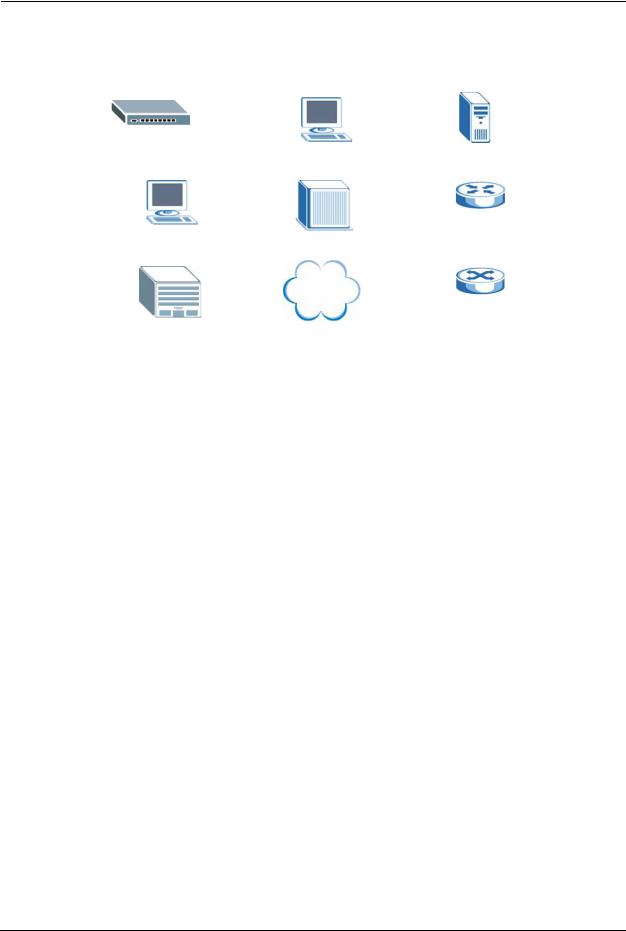
ES-2108/ES-2108-G User’s Guide
Graphics Icons Key
ES-2108/ES-2108-G |
Computer |
Server |
|
|
|
Computer |
DSLAM |
Gateway |
|
|
|
Central Office/ ISP |
Internet |
Hub/Switch |
|
|
|
User Guide Feedback
Help us help you. E-mail all User Guide-related comments, questions or suggestions for improvement to techwriters@zyxel.com.tw or send regular mail to The Technical Writing Team, ZyXEL Communications Corp., 6 Innovation Road II, Science-Based Industrial Park, Hsinchu, 300, Taiwan. Thank you.
22 |
Preface |

ES-2108/ES-2108-G User’s Guide
CHAPTER 1
Getting to Know Your Switch
This chapter introduces the main features and applications of the switch.
1.1 Introduction
The switch is a stand-alone layer-2 Ethernet switch with eight 10/100Mbps ports. The ES- 2108-G also includes one Gigabit/Mini-GBIC port.
With its built-in web configurator, managing and configuring the switch is easy. In addition, the switch can also be managed via Telnet, SSH (Secure SHell), any terminal emulator program on the console port, or third-party SNMP management.
1.2 Software Features
This section describes the general software features of the switch.
DHCP Client
DHCP (Dynamic Host Configuration Protocol RFC 2131 and RFC 2132) allows individual computers to obtain TCP/IP configuration at start-up from a server. You can configure the switch as a DHCP client to obtain TCP/IP information (such as the IP address and subnet mask) from a DHCP server. If you disable the DHCP service, you must manually enter the TCP/IP information.
VLAN
A VLAN (Virtual Local Area Network) allows a physical network to be partitioned into multiple logical networks. Devices on a logical network belong to one group. A device can belong to more than one group. With VLAN, a device cannot directly talk to or hear from devices that are not in the same group(s); the traffic must first go through a router.
Differentiated Services (DiffServ)
With DiffServ, the switch marks packets so that they receive specific per-hop treatment at DiffServ-compliant network devices along the route based on the application types and traffic flow.
Chapter 1 Getting to Know Your Switch |
23 |

ES-2108/ES-2108-G User’s Guide
Queuing
Queuing is used to help solve performance degradation when there is network congestion. Two scheduling services are supported: Strict Priority Queuing (SPQ) and Weighted Round Robin (WRR). This allows the switch to maintain separate queues for packets from each individual source or flow and prevent a source from monopolizing the bandwidth.
Port Mirroring
Port mirroring allows you to copy traffic going from one or all ports to another or all ports in order that you can examine the traffic from the mirror port (the port you copy the traffic to) without interference.
Static Route
Static routes tell the switch how to forward IP traffic when you configure the TCP/IP parameters manually.
IGMP Snooping
The switch supports IGMP snooping enabling group multicast traffic to be only forwarded to ports that are members of that group; thus allowing you to significantly reduce multicast traffic passing through your switch.
STP (Spanning Tree Protocol) / RSTP (Rapid STP)
(R)STP detects and breaks network loops and provides backup links between switches, bridges or routers. It allows a switch to interact with other (R)STP -compliant switches in your network to ensure that only one path exists between any two stations on the network.
Link Aggregation
Link aggregation (trunking) is the grouping of physical ports into one logical higher-capacity link. You may want to trunk ports if for example, it is cheaper to use multiple lower-speed links than to under-utilize a high-speed, but more costly, single-port link.
Port Authentication and Security
For security, the switch allows authentication using IEEE 802.1x with an external RADIUS server and port security that allows only packets with dynamically learned MAC addresses and/or configured static MAC addresses to pass through a port on the switch.
Maintenance and Management Features
•Access Control
You can specify the service(s) and computer IP address(es) to control access to the switch for management.
•Cluster Management
24 |
Chapter 1 Getting to Know Your Switch |

ES-2108/ES-2108-G User’s Guide
Cluster management (also known as iStacking) allows you to manage switches through one switch, called the cluster manager. The switches must be directly connected and be in the same VLAN group so as to be able to communicate with one another.
•Configuration and Firmware Maintenance
You can backup or restore the switch configuration or upgrade the firmware on the switch.
1.3Hardware Features
This section describes the ports on the switch.
Ethernet Ports
The ports allow the switch to connect to another Ethernet devices.
Gigabit Ethernet Port
Avaliable on the ES-2108-G, the port allows the switch to connect to another WAN switch.
Mini-GBIC Slot
Install SPF transceivers in this slot to connect to other Ethernet switches at longer distances than the Ethernet port.
Console Port
Use the console port for local management of the switch.
1.4 Applications
This section shows a few examples of using the switch in various network environments.
1.4.1 Backbone Application
In this application, the switch is an ideal solution for small networks where rapid growth can be expected in the near future.
The switch can be used standalone for a group of heavy traffic users. You can connect computers directly to the switch’s port or connect other switches to the switch.
In this example, all computers can share high-speed applications on the server. To expand the network, simply add more networking devices such as switches, routers, computers, print servers etc.
Chapter 1 Getting to Know Your Switch |
25 |
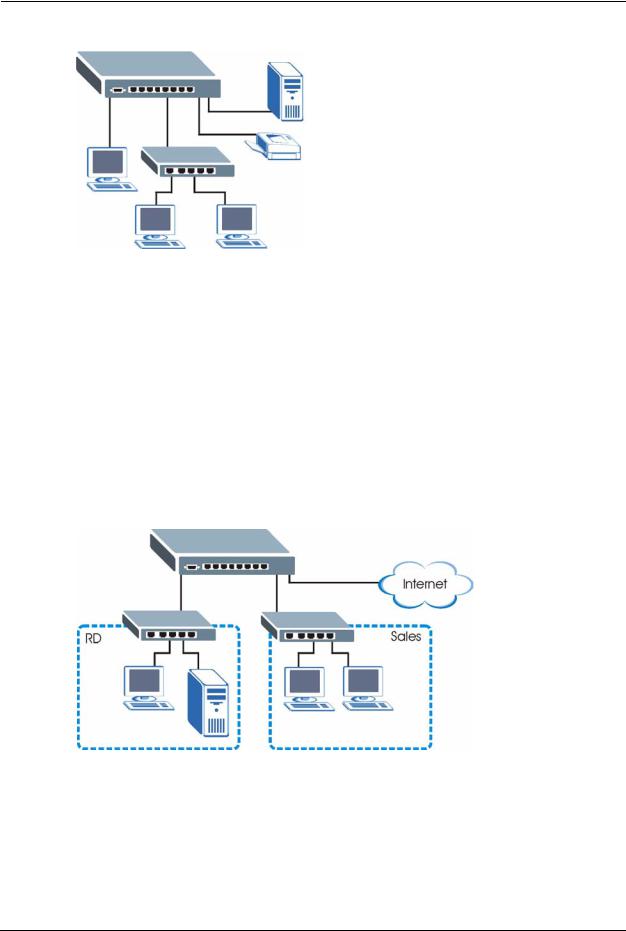
ES-2108/ES-2108-G User’s Guide
Figure 1 Backbone Application
1.4.2 Bridging Example
In this example application the switch connects different company departments (RD and Sales) to the corporate backbone. It can alleviate bandwidth contention and eliminate server and network bottlenecks. All users that need high bandwidth can connect to high-speed department servers via the switch.
For ES-2108G, you can provide a super-fast uplink connection by using a Gigabit Ethernet/ mini-GBIC port on the switch.
Moreover, the switch eases supervision and maintenance by allowing network managers to centralize multiple servers at a single location.
Figure 2 Bridging Application
1.4.3 High Performance Switched Example
The switch is ideal for connecting two networks that need high bandwidth. In the following example, use trunking to connect these two networks.
26 |
Chapter 1 Getting to Know Your Switch |
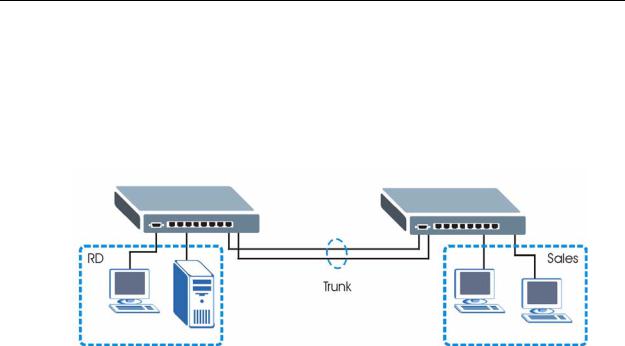
ES-2108/ES-2108-G User’s Guide
Switching to higher-speed LANs such as ATM (Asynchronous Transmission Mode) is not feasible for most people due to the expense of replacing all existing Ethernet cables and adapter cards, restructuring your network and complex maintenance. The switch can provide the same bandwidth as ATM at much lower cost while still being able to use existing adapters and switches. Moreover, the current LAN structure can be retained as all ports can freely communicate with each other.
Figure 3 High Performance Switched Application
1.4.4 IEEE 802.1Q VLAN Application Examples
This section shows a workgroup and a shared server example using 802.1Q tagged VLANs.
A VLAN (Virtual Local Area Network) allows a physical network to be partitioned into multiple logical networks. Stations on a logical network belong to one group. A station can belong to more than one group. With VLAN, a station cannot directly talk to or hear from stations that are not in the same group(s) unless such traffic first goes through a router.
For more information on VLANs, refer to Chapter 8, “VLAN,” on page 67.
1.4.4.1 Tag-based VLAN Example
Ports in the same VLAN group share the same frame broadcast domain thus increase network performance through reduced broadcast traffic. VLAN groups can be modified at any time by adding, moving or changing ports without any re-cabling.
Chapter 1 Getting to Know Your Switch |
27 |
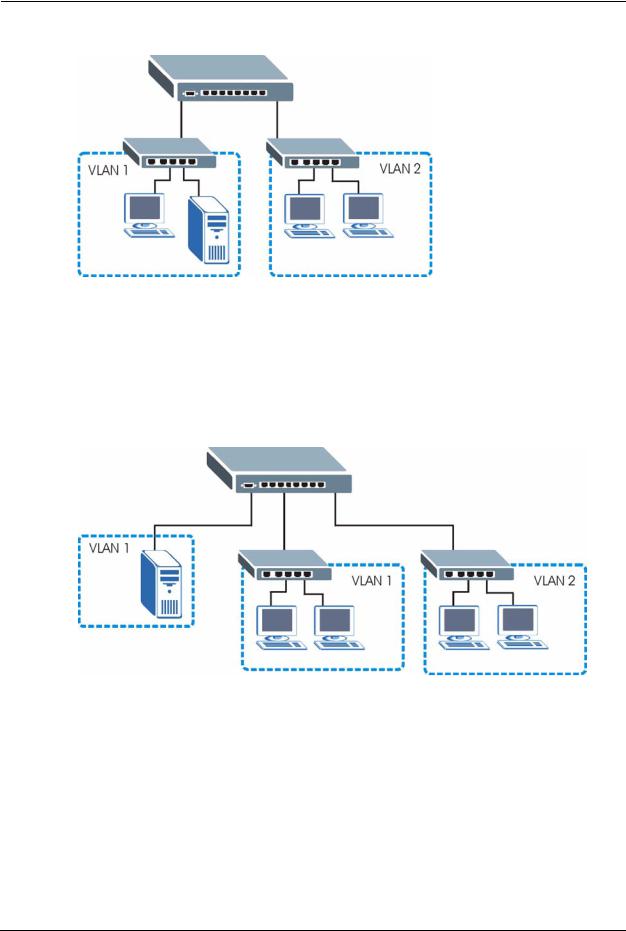
ES-2108/ES-2108-G User’s Guide
Figure 4 Tag-based VLAN Application
1.4.4.2 VLAN Shared Server Example
Shared resources such as a server can be used by all ports in the same VLAN as the server, as shown in the following example. In this example, only ports that need access to the server need belong to VLAN 1. Ports can belong to other VLAN groups too.
Figure 5 Shared Server Using VLAN Example
28 |
Chapter 1 Getting to Know Your Switch |
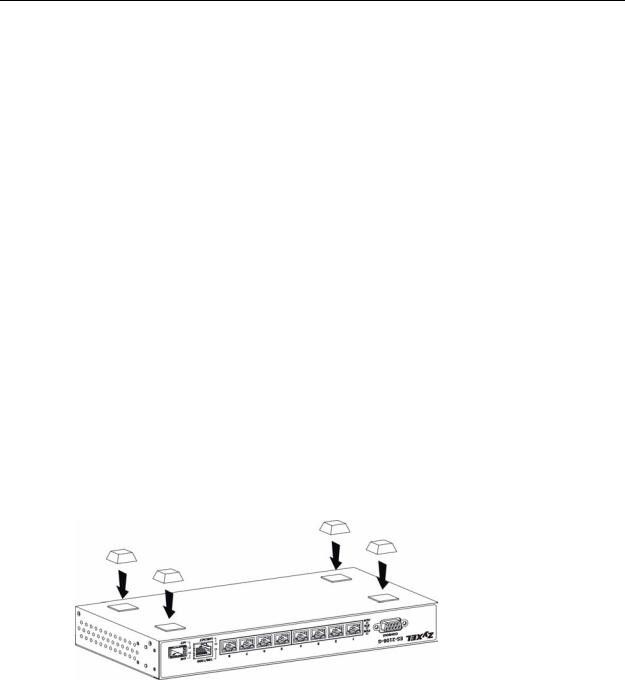
ES-2108/ES-2108-G User’s Guide
CHAPTER 2
Hardware Installation and
Connection
This chapter shows you how to install and connect the switch.
2.1 Freestanding Installation
1Make sure the switch is clean and dry.
2Set the switch on a smooth, level surface strong enough to support the weight of the switch and the connected cables. Make sure there is a power outlet nearby.
3Make sure there is enough clearance around the switch to allow air circulation and the attachment of cables and the power cord.
4Remove the adhesive backing from the rubber feet.
5Attach the rubber feet to each corner on the bottom of the switch. These rubber feet help protect the switch from shock or vibration and ensure space between devices when stacking.
Figure 6 Attaching Rubber Feet
Note: Do NOT block the ventilation holes. Leave space between devices when stacking.
For proper ventilation, allow at least 4 inches (10 cm) of clearance at the front and 3.4 inches (8 cm) at the back of the switch. This is especially important for enclosed rack installations.
Chapter 2 Hardware Installation and Connection |
29 |
